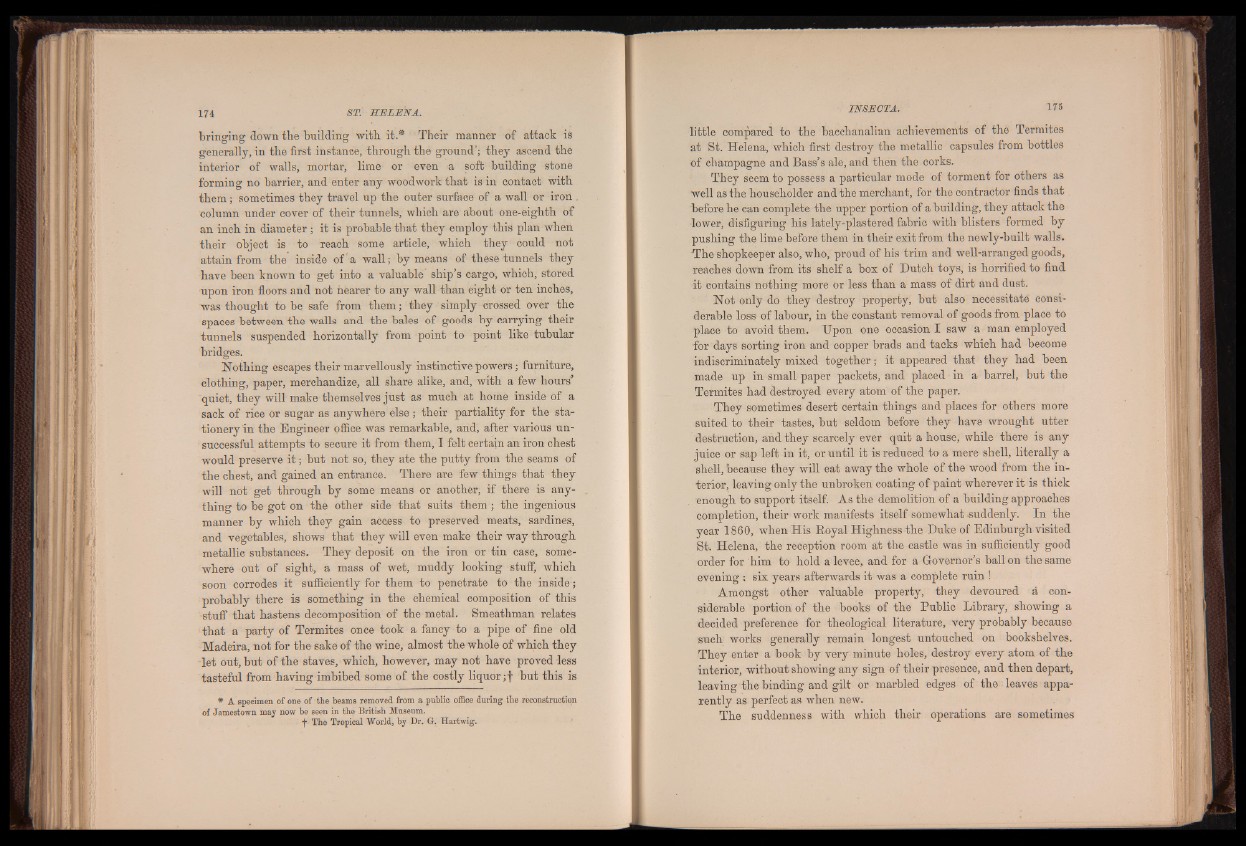
bringing down the building with it.* Their manner of attack is
generally, in tbe first instance, through the ground’; they ascend the
interior of walls, mortar, lime or even a soft building stone
forming no barrier, and enter any woodwork that is in contact with
th em ; sometimes they travel up the outer surface of a wall or iro n .
column under cover of their tunnels, which are about one-eighth of
an inch in diameter; it is probable that they employ this plan when
their object is to reach some article, which they could not
attain from the inside of a wall; by means of these tunnels they
have been known to get into a valuable' ship’s cargo, which, stored
upon iron floors and not nearer to any wall than eight or ten inches,
was thought to be safe from them; they simply crossed over the
spaces between the walls and the bales of goods by carrying their
tunnels suspended horizontally from point to point like tubular
bridges.
Nothing escapes their marvellously instinctive powers; furniture,
clothing, paper, merchandize, all share alike, and, with a few hours’
quiet, they will make themselves just as much at home inside of a
sack of rice or sugar as anywhere else; their partiality for the stationery
in the Engineer office was remarkable, and, after various unsuccessful
attempts to secure it from them, I felt certain an iron chest
would preserve it;'b u t not so, they ate the putty from the seams of
the chest, and gained an entrance. There are few things that they
will not get through by some means or another, if there is anything
to be got on the other side that suits th em ; the ingenious
manner by which they gain access to preserved meats, sardines,
and vegetables, shows that they will even make their way through
metallic substances. They deposit on the iron or tin case, somewhere
out of sight, a mass of wet, muddy looking stuff, which
soon corrodes it sufficiently for them to penetrate to the inside;
probably there is something in the chemical composition of this
stuff that hastens decomposition of the metal. Smeathman relates
that a party of Termites once took a fancy to a pipe of fine old
Madeira, not for the sake of the wine, almost the whole of which they
let out, but of the staves, which, however, may not have proved -less
tasteful from having imbibed some of the costly liquor ;f but this is
* A specimen of one of the heams removed from a public office during the reconstruction
of Jamestown may now be seen in the British Museum.
•(• The Tropical World, by Dr. 6. Hartwig.
little compared to the bacchanalian achievements of the Termites
at St. Helena, which first destroy the metallic capsules from bottles
of champagne and Bass’s ale, and then the corks.
They seem to possess a particular mode of torment for others as
well as the householder and the merchant, for the contractor finds that
before he can complete the upper portion of a building, they attack the
lower, disfiguring his lately-plastered fabric with blisters formed by
pushing the lime before them in their exit from the newly-built walls.
The shopkeeper also, who, proud of his trim and well-arranged goods,
reaches down from its shelf a box of Dutch toys, is horrified to find
it contains nothing more or less than a mass of dirt and dust.
Not only do they destroy property, but also necessitate considerable
loss of labour, in the constant removal of goods from place to
place to avoid them. Upon one occasion I saw a man employed
for days sorting iron and copper brads and tacks which had become
indiscriminately mixed together; it appeared that they had been
made up in small paper packets, and placed in a barrel, but the
Termites had destroyed every atom of the paper.
They sometimes desert certain things and places for others more
suited to their tastes, but seldom before they have wrought utter
destruction, and they scarcely ever quit a house, while there is any
juice or sap left in it, or until it is reduced to a mere shell, literally a
shell, because they will eat away the whole of the wood from the interior,
leaving only the unbroken coating of paint wherever it is thick
enough to support itself. As the demolition of a building approaches
completion, their work manifests itself somewhat suddenly. In the
year 1860, when His Royal Highness the Duke of Edinburgh visited
St. Helena, the reception room at the castle was in sufficiently good
order for him to hold a levee, and for a Governor’s ballon the same
evening : six years afterwards it was a complete ruin !
Amongst other valuable property, they devoured a considerable
portion of the books of the Public Library, showing a
decided preference for theological literature, very probably because
such works generally remain longest untouched on bookshelves.
They enter a book by very minute holes, destroy every atom of the
interior, without showing any sign of their presence, and then depart,
leaving the binding and gilt or marbled edges of the leaves apparently
as perfect as when new.
The suddenness with which their operations are sometimes